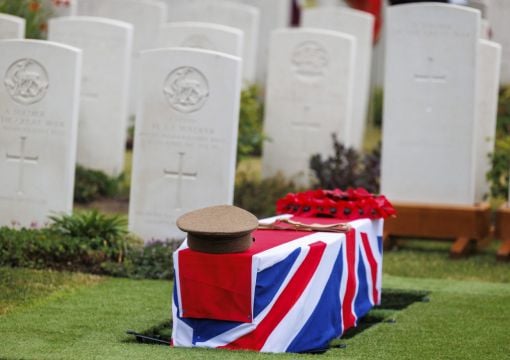British and Canadian authorities have given seven soldiers killed more than a century ago in the First World War a full military burial after their remains were discovered during a gas pipeline construction near Ypres, Belgium.
The soldiers were found in two separate burial sites near the Belgian town at the heart of Flanders Fields, where hundreds of thousands perished between 1914 to 1918.
The ceremony took place on Thursday at the New Irish Farm Commonwealth War Grave near Ypres.

In total, 63 sets of First World War soldiers’ remains were uncovered by archaeologists during the work between 2014 and 2016.
“We remember, we reconnect with Private John Lambert. He was a mechanic making 40 cents a day… signed up to make one dollar a day and immediately gave 60 cents a day to his sister,” said Reverend Gary Watt, referring to one of the soldiers, Canadian Private John Lambert of the Newfoundland Regiment.
Mr Lambert was identified through DNA. He died on August 16 1917.
“He exaggerated his age in order to answer more willingly and more readily the call to serve freedom and democracy,” Mr Watt continued. “Private John Lambert had common sense of the common good. He knew that complacency would not stop the robbing of freedom.”

Five of the remains were from unknown British soldiers, and one unknown German soldier was also reburied. Archaeologists have discovered artefacts that link the unknown soldiers to Britain and Germany.
The evolution of DNA technology has allowed for the identification of more and more unknown soldiers from the First World War.
Earlier this month, a great-great-nephew of English poet William Wordsworth – who was recently identified by DNA research – was given a funeral ceremony in France, 105 years after he died.







